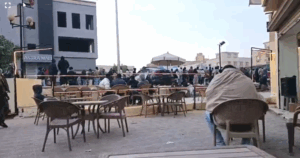US envoy asks Sudan rebels to respond to ceasefire
International envoys have requested the Sudan Revolutionary Front (SRF) at a meeting in Paris to respond to the Sudanese government’s declaration of a temporary ceasefire. They also asked…
International envoys have requested the rebel Sudan Revolutionary Front (SRF) at a meeting in Paris to respond to the Sudanese government's declaration of a temporary ceasefire. They also asked the armed movements to unite their positions on the matter, which will be disclosed in a paper the rebels plan to submit to the envoys.
Dr Jibril Ibrahim, head of the Justice and Equality Movement (JEM) and SRF vice-president, told Radio Dabanga that the special envoys' request found “a great response” from the attending Darfur rebel leaders at a meeting on Thursday.
The rebel leaders, under the banner of the SRF alliance, told the special envoys from the US and the UK that the two-month ceasefire declared by the government is “not real”. “The declaration came in Sudan's rainy season, when fighting usually stops and military operations cease,” Ibrahim explained. “But the government has continued to bomb civilians in several areas continuously.”
The JEM leader pointed to the fact that the rebel movements have suggested a cessation of hostilities “three times earlier”, to enable the provision of humanitarian aid to conflict-affected areas. These did not find any response from the regime, he said.
He noted that the JEM, the Sudan Liberation Movement led by Abdel Wahid (SLM-AW) and the faction led by Minni Minawi (SLM-MM) at the meeting agreed with the envoys on Thursday to submit an agreement that bears their vision and requirements of a possible ceasefire.
“The US envoy said that the standpoint of the rebels is relevant for the national dialogue.”
US special envoy Donald Booth, according to Ibrahim, asked the rebel leaders about their positions on the matter during the meeting. “He asked, 'Will it be a ceasefire in Darfur, separate from Blue Nile and Nuba Mountains? Or will it be comprehensive? And who should oversee the ceasefire?' And, 'Is Unamid the appropriate body to oversee this or someone else?'”
Ibrahim revealed that they made it clear to Booth that they are against separating a ceasefire into the three regions. The answers to his other questions may be given when the rebel movements submit their agreement.
“The envoys also spoke about the issues that are to be discussed in Sudan's national dialogue, and that the standpoint of the armed movements is relevant. Specifically regarding the war-related issues. These must be negotiated directly with the government to reach an agreement,” Ibrahim quoted their remarks.
In the past three days the SRF, -and through conference call- delegates of the Sudan Appeal group and the head of the Reform Now Movement met in Paris with Donald Booth, British counterpart Matthew Cannell, the head of France's African affairs department, the European Union envoy for the Horn of Africa, and a representative of Norway.
They discussed, among others, the African Union council's proposal on 25 August to set up a pre-dialogue meeting for the national dialogue process in Sudan.











 and then
and then